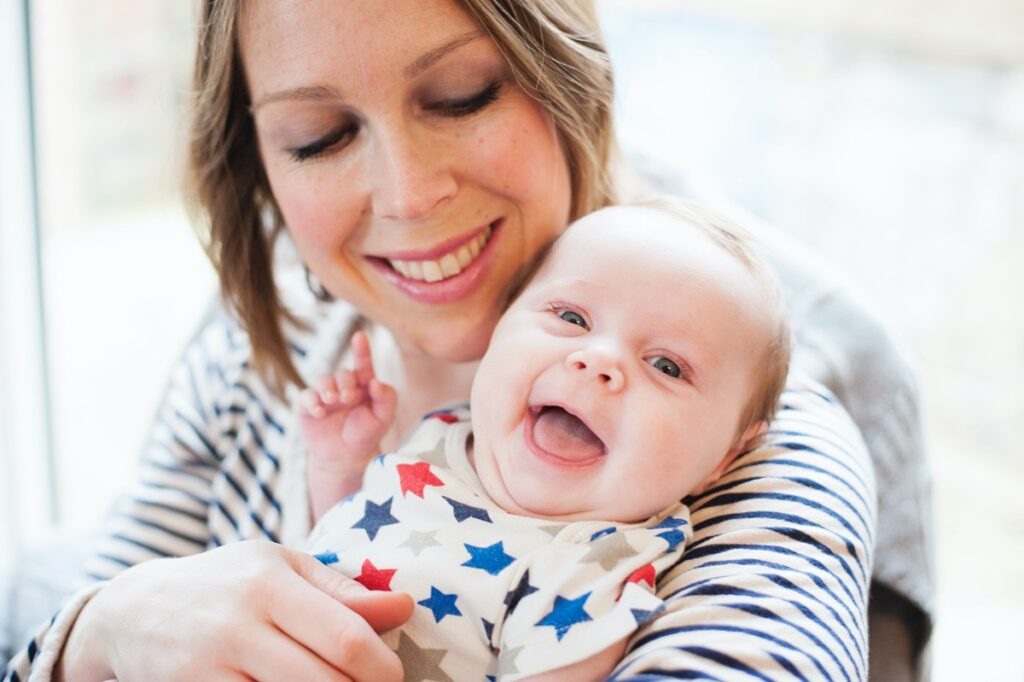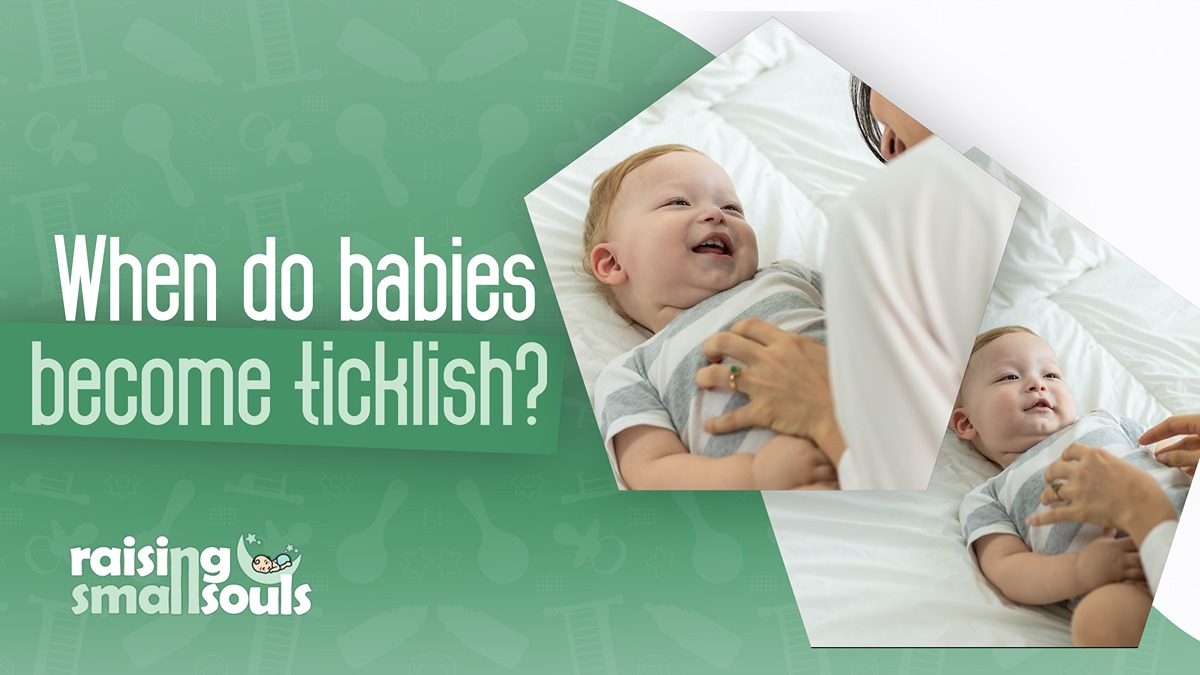When you first bring your baby home from the hospital it doesn’t really do much. It mostly eats and sleeps. But, after a few months, babies develop a sense of their surroundings and start to show signs of emotions.
As a parent, you are probably most fond of their happiness which is often linked to their laughter, so you want to make them laugh more.
You make silly faces at them, you show them new toys and maybe you even try to tickle them. You’ll notice that some babies don’t react to tickling, so you start to wonder when do babies become ticklish and if it is safe for them.
Main Points
- Babies usually start laughing around 4 months old.
- They can feel you tickling them around 6 months old.
- Some babies don’t like being tickled.
- There are other ways to make your baby laugh if they don’t like tickling.
When does a baby become ticklish?

Babies usually start to show emotion around 4 months, this is also when they start laughing. They start showing emotion while getting tickled usually around 6 months old.
Before this your baby can’t comprehend where is the tickling coming from, it won’t know that the tickling is done by the person in front of it and this may cause some discomfort or even fear.
After the 6-mount mark, this is usually the time when babies get ticklish so you can start to gently tickle your baby to see what kind of reaction it will have. Around this time in their development babies should be able to express whether or not they enjoy being tickled.
The science behind it

Researchers and philosophers have been trying to figure out what is tickling and what exactly does it do for hungered if not thousands of years. To be honest, nobody really knows what kind of reaction ticking causes in the brain of infants or adults for that matter.
Scientists did however discover that being tickled activates the hypothalamus, which is an area in the brain in charge of emotions and pain response. This is also where your fight-or-flight instinct comes from.
People respond differently to tickling, some freeze up, and some try to push the person who is tickling them away.
This is your fight-or-flight instinct kicking in. When you are being tickled you probably laugh, but this isn’t because you find it funny, it’s because the part of your brain that is responsible for emotions is being activated.
Some researchers found that your body can’t tell the difference between getting tickled and getting attacked, but your common sense makes sure you recognize that the person tickling you does not pose a danger.
This is why it’s very hard to tickle yourself. The part of your brain called the cerebellum knows your own movement and it can predict the sensation it will cause. This is not the case when someone else is tickling you and that’s why a reaction is activated.
Does my baby like being tickled?
Prolonged tickling may cause discomfort. А baby’s skin is very sensitive so trying to get your baby to laugh by ticking it may be painful.
After 6 months your baby should be able to express emotions and you’ll know if they enjoy being tickled or not based on their facial expression and body movement.
If a baby dislikes being tickled it will try to roll away, it will mumble sounds of displeasure, get teary-eyed or start crying, make a grimace or try to push your hand away.
Remember laughter is a natural emotional response when being tickled and it doesn’t always mean pleasure.
Safety
Tickling is considered to be generally safe for your baby. However, you want to avoid tickling your baby when it’s sick or feeling drowsy.
Also, you want to avoid tickling your baby after or during feeding. When your baby is being tickled it can swallow air and get the hiccups which are not fun even for a full-grown adult.
Ticking spots
Tickling can be beneficial for your baby if done in moderation. If you see that your baby enjoys being tickled there are a few places that are considered to be the best tickling spots.
We all know the “this little piggy” game, the feet are overall very sensitive to tickling, especially the toes, so you can try playing this game with your baby and see if it likes it.
If you have long nails and are afraid of scratching your baby, then a fun tickling game is doing the “motorboat” on its belly. This also makes a silly noise that babies usually enjoy.
Other sensitive areas include the neck, behind the knees, the sides of the torso, and the armpits. Make sure to check and see how your baby responds to being tickled in these areas.
Other solutions
If you find that your baby shows signs that it doesn’t like being tickled, don’t worry, there are other ways to make your baby show emotions that will fill the room with laughter.
Silly faces
Let’s face it, get it to face it…. All babies like it when you make goofy faces at them. Rolling your eyes, twisting your lips in weird shapes, and sticking out your tongue is a classic way to make a baby burst out into laughter.
Peek a boo

Another classic. Place your hands on your face to hide it and then move your hands away from each other while saying “peek a boo”. This has babies laughing and smiling for hours, some even will try to imitate you when they are a bit older.
Funny noises
Squeaking, whistling, or even gurgling, babies love noises and some will for sure make them giggle.
Eskimo kisses
Some kids love to be close to their parents. Not only is nose-touching adorable, but it can also make your baby giggle and feel safe and loved.
Pets
Babies love pets, especially if your pet has been around since day one. The baby is already used to them and doesn’t view them as a threat, but rather as a part of the family.
So, the next time you want to make your baby laugh, bring your pet into the room and start playing with them. Make sure that your pets are comfortable around your baby, some can get scared and try to run away or defend themselves. Also, make sure your baby doesn’t try to hurt the pet by pulling its tail or ears because this can cause your pet to fight back.
Conclusion
As a parent, you are probably most fond of the sound of your child’s laughter and will do anything to make them laugh even tickling them.
If you are wondering when do babies get ticklish and if is it safe to try to tickle them the answer is that after 6 months, it’s totally safe to try doing a few belly rubs here and there. However, keep an eye out for any signs of discomfort and tickle your baby with moderation.
If you see that your baby does not enjoy being tickled, you can try other ways of making it laugh such as funny noises, goofy faces, toys or even playing with your pet.

When it comes to raising children, there’s a lot to learn! I’m here to share everything i learnt along the way.

